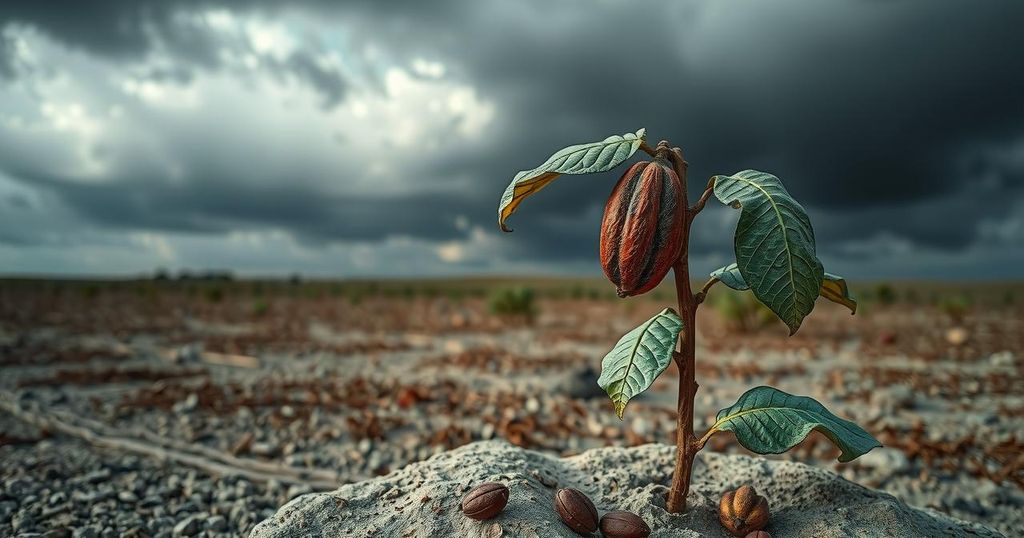Climate Change’s Adverse Effects on Cocoa Production and Chocolate Prices

Climate change is causing significant challenges for cocoa cultivation essential for chocolate production. Research shows that rising temperatures negatively impact yield quality, leading to increased cocoa prices, which surged 136% from July 2022 to February 2024. Farmers’ livelihoods are increasingly threatened, necessitating urgent measures to address these issues, as highlighted by Climate Central and Christian Aid.
A recent report indicates that climate change is adversely impacting chocolate production, particularly cocoa cultivation, which is essential for the confectionery industry. Research conducted by Climate Central, a U.S.-based organization, reveals that rising temperatures are making it increasingly difficult to grow cacao trees, leading to higher chocolate prices and potential scarcity in the future. In tandem, UK charity Christian Aid highlights the negative effects on farmers who cultivate cocoa plants, who are facing greater challenges due to changing climate conditions.
Climate Central studied temperature variations in major cocoa-producing countries over the past decade. It reported that excessive heat during critical growing months is detrimental to cacao trees, which cannot thrive in temperatures exceeding 32 degrees Celsius (89.6 degrees Fahrenheit). The findings indicate an additional three weeks of heat each year in the Ivory Coast and Ghana during the primary growing season, subsequently affecting yield quality and quantity.
As a result of these climatic changes, the price of cocoa has surged dramatically—by 136% from July 2022 to February 2024. This increase is attributed to the hotter temperatures impacting crop yields, compounded by issues such as increased rainfall and insect infestations. These challenges severely threaten the livelihoods of cocoa farmers, a vital source of income for many in impoverished regions.
“Growing cocoa is a vital livelihood for many of the poorest people around the world and human-caused climate change is putting that under serious threat,” stated Osai Ojigho, director of Christian Aid’s policy and public campaigns. The report underscores the critical intersection of climate change, economic stability, and food security, emphasizing the urgent need for sustainable agricultural practices in cocoa production.
In conclusion, the dual impact of climate change on cocoa production threatens to drive prices up and reduce availability, significantly affecting farmers’ livelihoods. As global temperatures continue to rise, immediate action is required to mitigate these effects and to support sustainable farming practices that will safeguard both cocoa production and the farmers who rely upon it. Immediate policy initiatives and collaborative efforts within the chocolate industry are essential to address these challenges effectively.
In summary, the ongoing impacts of climate change are threatening cocoa production, which poses risks to both chocolate availability and the livelihoods of many cocoa farmers. The alarming rise in cocoa prices, attributed largely to increasing temperatures and other climatic factors, necessitates urgent measures to mitigate these effects. Sustainable practices and policies are crucial to protect the future of cocoa cultivation and support vulnerable farming communities impacted by these environmental changes.
Original Source: www.bbc.co.uk






